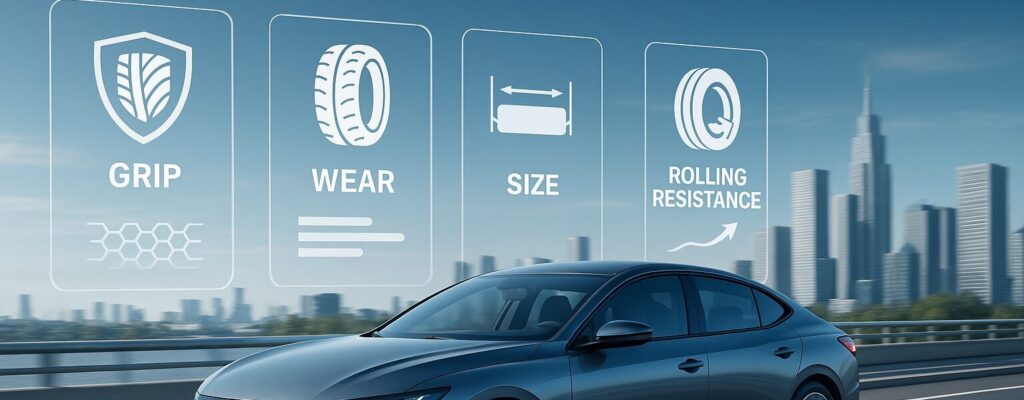
The rise of EVs (electric vehicles): what are the consequences for the tire industry?
Since 2020, the development of EVs has seen significant growth. In 2024, EVs accounted for 10% of all new models launched in the United States.
In response to Chinese made EVs flooding the market, European manufacturers have launched a large number of EVs over the past year, including the BMW i5 & iX2, Audi Q6 e-tron, Skoda Elroq and Renault 5. Some of the models are now available in the United States.
EVs are different from conventional vehicles for a number of reasons:
- Electric motors deliver instant power with maximum torque when the vehicle starts up.
- The braking system (known as regenerative braking) is different on electric vehicles. The electric motor is automatically used to recover the kinetic energy generated by braking. This energy is transformed into electrical energy which recharges the vehicle’s battery.
- The weight of an EV is much greater because of the batteries.
- Finally, electric vehicles are quieter because of their motor technology.
These characteristics have an impact on the tire industry. With the rapid rise in manufacturing these vehicles, tire manufacturers have had to adapt to newly imposed requirements.
To meet these requirements, manufacturers have created specific products or ranges dedicated to EVs. Some manufacturers have added the 2 letters ‘EV’ (standing for Electric Vehicle) to the name of their product or have created a specific ‘EV’ marking, while others have launched a range of products such as Hankook’s iON range. We can see that the range of tires available on the U.S. market for EVs has literally exploded over the last 5 years, rising from just a few dozen products in 2020 to almost 1,000. (We are excluding tires with an EV Ready marking, which are equally well suited to electric, hybrid and internal combustion vehicles).
*Source: Lizeo – Evolution of the range of EV tires available for sale online from Lizeo Global Tire Database.
Tires designed and adapted to the specific needs of electric vehicles:
1. Maintaining grip when faced with instant maximum power
Because of the instantaneous power of the electric motors as soon as the vehicle is started up, tires are under significant stress. They must be strong enough to withstand and transmit the surge of power and have excellent grip to ensure good traction.
2. Reducing tire wear
With the acceleration and regenerative braking inherent in EVs, tires wear out more quickly. To improve tire longevity, tire manufacturers have modified the composition of the rubber, making it much more resistant.
3. Supporting the weight of the vehicle
EVs are much heavier than internal combustion vehicles because of the batteries. These are generally located at the bottom of the vehicle, lowering the center of gravity. These constraints mean that tire manufacturers have to design reinforced tires capable of supporting this extra load while maintaining performance and durability. With the growth of electric vehicles on the market, reinforced tires in XL (Extra Load) and HL (Heavy Load) sizes have become increasingly popular. HL tires were introduced to the market in 2021 to support even greater loads than XL tires.
4. Reducing rolling resistance
Reducing rolling resistance to increase the vehicle range is a major challenge for car manufacturers. For this reason, they opt for narrower tires to reduce the surface area in contact with the ground. To maintain sufficient load capacity, the diameter of these tires has increased.
An analysis of the tire offerings online in the United States reveals that 75% of EV tires are available in 19, 20 and 21 inch sizes, while 58% of models on the market as a whole are in 16, 17 and 18 inch sizes.
*Source: Lizeo – Evolution of the range of EV tires available for sale online from Lizeo Global Tire Database.
5. Maintaining on-board comfort
Electric cars are much quieter than internal combustion cars. As a result, tire noise can no longer be masked by engine noise. Tire manufacturers therefore use treads made from a specific rubber that limits the production of decibels. Narrower tires also contribute to this reduction in noise.
Tires for EVs are generally more expensive than tires for conventional vehicles. The reinforced structure and the rubber used to meet the requirements of EVs explain this price difference.
Additional Reporting Available From Lizeo®
Which manufacturers offer tires for electric cars and at what price?
Which tire sizes (narrow or wide) can be fitted to current EVs on the market?